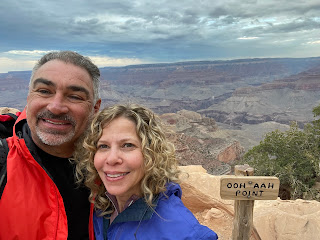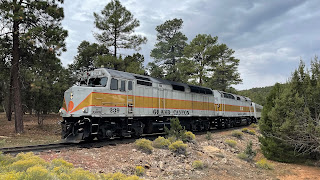This trip has afforded us the opportunity to hike some of the most iconic trails in the USA. Trails that attract people from around the globe and have done so for many decades. Today, on our last of 8 straight days of hiking, we will attempt the most dramatic hike of our trip, the Kaibab Trail. By the numbers, it’s similar to yesterday’s trek, 6 miles roundtrip and dropping 2200 feet below the rim of the Grand Canyon. But it’s different, too. The trail has very steep grades followed by relatively long flats, so we will get further towards the middle of the canyon, but the return will be more punishing. Yesterday from Bright Angel Lookout, we were able to get a great photo of today’s trail.
We’re out early, but not as early as yesterday. It rained a bit last night and the remaining cloud
cover will be our friend today. The wind
when we start down the trail, not so much, blowing the fine sand into our eyes
and mouths. Fortunately, the wind
subsided within the initial few hundred feet of elevation drop. Just under a mile and we get to the aptly
named Ooo-Ahh point (who said the 19th century miners didn’t have a
sense of humor?) Instagram was pretty
much invented for selfies here.
When our oohing and aahing subsides, we continue on to the first
narrow ridgeback, about 2 feet wide along this section’s top spine with steep drop-offs
on either side and sweeping 270 degree views.
It’s exactly what you hope for when you think hiking. We’re taking in the enormity of the scene while
doing our best to not lose focus and accidently step into thin air.
Another steep decline and we reach the 2nd
ridgeback at Cedar Point, half the way down now. It’s just as exciting to traverse as the
first and even more picturesque. Across the ridge, the trail circles the peak
we have been approaching this whole time.
Around the other side, we arrive at Skeleton Point, marked by a carved
wooden sign and our furthest point out today. Thanks to a chatty hiker we met along the
way, we know to duck left behind the unmarked donkey hitching post. Just as our momentary friend advised, we are
rewarded with the most amazing views of the Colorado River we will have during
this trip. There are three flat tiers like
stadium seating and a few people scattered about, all snacking, resting and
generally appreciating our place in time.
We start our way back up. Today is mentally easier because we’re not
worried about sun and pretty much know what to expect from the trails. We’re better equipped to absorb what we’re
seeing and notice how oddly lush the landscape is here. Our expectations were rocks, dirt and dust,
but a wide variety of flora has figured out how to make this place home, dense arrangements
of yellows and greens with the occasional accent splash of tiny, brightly
colored flowers. We take special notice
of the tall, skinny seed pod plants with the base that looks like banana yellow
aloe. If there’s a bit of soil and even
a hint of water, there is a plant that will figure out how to survive there.
We make it back to Cedar Point and stop for lunch, or whatever you call a chicken Ceasar wrap and an orange eaten at 9:45am. There is no potable water along this trail (or any water for that matter) so we’re hydrating but rationing and rationalizing some. Water is heavy, like fuel on an airplane, so like that fuel, you calculate, add a safety factor and decide how much to bring before you take off. But any pilot will tell you that every flight is running out of fuel at all times. We push a few yards back past OohAhh, now crowded with picture takers, and set our sights on the final ascent of the trip. We apparently saved the steepest switchbacks for last, when we’re most tired, most sore. Great planning. We finish our last sips of water as we broach the canyon rim, feeling like Rocky finally making the top of the Art Museum steps, triumphant horn section music playing in our heads.
It’s only 11am and there’s still plenty of park we want to
see, so we drive up to The Village and the start of Hermit Road, the shuttle-access
only lane with 9 scenic overlooks. Just
as we get to the start of the line, we hear the clang-clang-clang of the
crossing bells and we watch the approach of the fabled Grand Canyon Railway
train, historic locomotives and passenger cars smartly dressed in the line’s
silver and yellow livery that looks as close to my childhood HO train set as I
could have ever hoped for.
We have the DSLR and are hoping for one more photo get – the
elusive California Condor. We score at
our very first stop, Maricopa Point, a big specimen preening in the noon
sunshine. The bus driver has never even
seen one live before, throws the shuttle into park and joins us for a
look. The big 400mm lens is at its
limits trying to reach the bird on the far-away cliffside and we can get a few
grainy pix, so mostly we just use the camera as a telescope and watch the creature
being him (or her, it’s hard to tell) self.
We get a bit of rain during lunch, the first and only precipitation
we’ve seen on the entire trip. The light
shower passes quickly and is gone before as we get back to the Village. This time we’re here to see the legendary El
Tovar Hotel, the crown jewel of the historic National Park lodges. Designed by Charles Whittlesey as a mash up
between a Swiss chalet and Norwegian villa, it was considered the most elegant
hotel west of the Mississippi when it opened in 1905. The lobby is festooned with huge taxidermy
mounts, elk and ram and buffalo, a reminder of the days when every gentleman of
means had a trophy room of his own and his wife was cool using big, smelly,
dusty animals as décor.
Shower and well-deserved nap. We head back into the park for sunset and
choose Mather Point, close to the Visitor’s Center parking lot. At first, we’re disappointed that we’re not
going to actually see the sunset, the horizon obscured by the tall pine
trees. We stay because I’m here, Mandy’s
here, the Grand Canyon’s here, and we’re glad we did. Turns out that here, the sunset isn’t so much
about the sunset, but what the sunset does to the rocks and valleys. As many times as we promised ourselves we
were done taking pictures of rocks, here we are, taking dozens more. It’s why our grandparents and parents and we
come here. It’s why our children will
bring their children and grandchildren here.
It just doesn’t get old.

























No comments:
Post a Comment